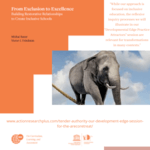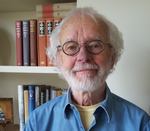Gladys Yinusa, PhD Candidate from Bournemouth University reflects on the AR+ eCO Retreat.

Gladys Yinusa is completing her action research dissertation as we speak. It titled “An action research study to improve ward practices”, and explores the influence of organisational culture in the provision of food and nutrition care for hospitalised patients. Gladys is a match-funded PhD student from the Department of Nursing Science, Bournemouth University, in collaboration […]
Read More...Tender Authority – Our Development Edge Session for the AR+E(co)Retreat

Victor Friedman, Michal Razer and Gili Talmor David share their work on “tender authority” which has emerged from 30 years of action research with schools. This work in helping teachers work more effectively with their most difficult students is described in their book Exclusion to Excellence: Building Restorative Relationships to Create Inclusive Schools They explain: […]
Read More...For ART’s sake. Action Research Transformations and ARJ

At Action Research Journal (ARJ), we have refreshed and deepened our commitment to emphasizing Action Research for Transformations (ART). Deepening commitment to ART Our commitment means that, henceforth, we’ll publish action research that is “transformative.” (Right that is not a simple matter; there is not a simple definition!). The journal’s associate editors – names listed […]
Read More...Resistant voices help us imagine alternatives. Reflecting with Timothy Pyrch

Timothy Pyrch is professor emeritus of the University of Calgary, Canada. He helped organize action researchers from around the world at the first academic congress in 1989. His work preserves indigenous ways of knowing the world, emphasizing story-telling. Timothy explains that in this time of social-ecological transition, we need insights that can disrupt the dominant […]
Read More...From power struggle to benevolent authority and empathic limit setting: Creating inclusive school practice with excluded students through action research

Empathic limit setting” is an effective innovative “relational” alternative to punishment with the toughest kids – developed with and by teachers through participative action research. It’s a great example of building actionable theory from practice, a valuable read for teachers, or anyone, working with risk/excluded young people.” Children who are excluded, for whatever reason, experience […]
Read More...